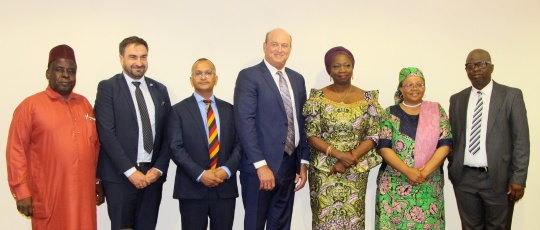He said ICT is essential to the efforts at preventing or investigating financial crimes or mitigating the risks associated with virtual assets in financial markets.
Dr. Maida stated this in his speech at the 11th Anniversary Lecture Series of RealNews Magazine at the Ikeja Sheraton Hotel, Lagos, on Tuesday.
The head of the telecoms regulatory agency was represented at the event by the NCC Director, Public Affairs, Mr. Reuben Muoka.
The NCC boss stated in the speech that the topic of the lecture, “The Use of ICT In Curbing Financial Crimes”, has become very important in the ecosystem.
He defined financial crimes as criminal activities that involve transactions, abuse, misuse, deception, or manipulation of financial systems for personal gain.
“They include a wide range of offenses such as insider abuse, money laundering, terrorism financing, proliferation financing, embezzlement, fraud (e-fraud, banking, securities, corporate, intellectual property) etc.
“These crimes do not only have a huge economic and social impact but can also be linked to violent crimes that lead to loss of lives.
“These crimes threaten the integrity, trustworthiness, stability, security, safety, and future of an entity (country, enterprise, individual),” he said.
Maida said the increasing adoption of digital technologies, the emergence of new technologies, and the often-transnational nature of the aforementioned crimes have broadened the scope of financial crimes and created further concerns.
He therefore submitted that robust ICT systems have facilitated compliance with established standards or regulations.
He added that they also provided a platform that would allow for the monitoring, tracing, and analysing of digital transactions in real-time.
“ICT systems support secure data storage and encryption technologies, which are critical for safeguarding sensitive financial data.
“Technological advancements have significantly aided crime prevention and law enforcement agency performance.
“Large datasets have been analyzed using advanced data analytics, artificial intelligence, and machine learning algorithms to look for trends that indicate criminal activity.
“Based on historical data and real-time intelligence, predictive police programs have arisen to foresee and prevent crimes.
“Digital forensics techniques have also proven useful in criminal investigations,” the NCC EVC/CEO added.
According to Maida, historically, a variety of legacy technologies have been used to combat crime.
He, however, added that, in more recent times, novel computer softwares and hardwares are being utilised to monitor individual transactions and communications for suspicious activity.
“For instance, anti-money laundering (AML) software uses algorithms to detect anomalous patterns in financial transactions that could suggest money laundering or other illegal activity.
“Law enforcement agencies are increasingly employing communication monitoring softwares to follow and analyze digital communications, such as emails, social media interactions, and instant messaging, in order to discover potential threats or illegal behaviour.
“These technologies improve the ability to detect and prevent illegal digital activity,” he further stated.
Maida noted that Nigeria’s telecoms sector has grown significantly, resulting in massive amounts of data being generated on a daily basis.
“The advent of advanced data analytics and Artificial Intelligence (AI) provides a gateway to identify suspicious digital patterns indicative of crime.
“Through partnerships with financial institutions data can be filtered to identify these suspicious patterns and nip them in the bud.
“These technologies provide real-time transaction monitoring, allowing for a proactive approach to crime prevention.
To combat financial crimes, he stated that innovative solutions such as blockchain, instant payments, artificial intelligence, machine learning, data analytics, regulatory technology solutions, and automated procedures are being deployed.
“The use of technological tools has made it significantly easier to deal with financial crime while building a long term strategy for combating it.
“Computer Security Incident Response Team (CSIRT) is a group of experts (of which NCC is part of) that handles security incidents that can affect the operations of organisations.
“Digital forensics is a branch of forensic science that focuses on identifying, acquiring, processing, analysing, and reporting on data stored electronically.
“Electronic evidence is related to criminal activities and can be admitted in the process of prosecuting offenders in law courts,” he added.
Maida also said the incorporation of biometric authentication into financial transactions represented a big step forward in fraud prevention.
“The NCC makes certain that telecom carriers follow strict biometric registration rules, which improves the accuracy and security of customer data and in turn financial transactions.
“Law enforcement agencies and financial institutions have used Palantir’s data analytics platform to examine massive volumes of data for patterns indicative of financial crimes.
“It permits the integration of many data sources, allowing for more thorough investigations.
“Chainalysis specialises in blockchain analysis and provides tools for tracking cryptocurrency transactions.
“This platform supports law enforcement in tracing illicit blockchain activity such as money laundering, ransomware payments, and illegal transactions.
“Concerning the significance of data security and privacy in the use of ICT for crime prevention, strong encryption and access controls ensure the security of critical information.
“Strict respect for data privacy standards, such as the GDPR (General Data Privacy Regulation) in the European Union and the (NDPA) Nigerian Data Protection Act, aids in the preservation of trust in the use of ICT solutions for crime prevention,” he said.
Maida however did not fail to identify potential concerns linked with the use of ICT to combat financial crime.
These, he said, included threats to cybersecurity; false positives and algorithmic bias; human capacity issue; regulatory compliance; technological obsolescence and funding issue.
He stated that, while ICT has transformed the fight against financial crime, there are still difficulties that must be addressed collaboratively.
He stated that inclusion and the digital divide access to ICT services is not equal for all parts of the population.
“The NCC is actively working to close the digital gap by pushing projects aimed at providing inexpensive and accessible ICT services to underprivileged communities.
“This inclusion is critical in ensuring that all citizens have the tools they need to conduct financial transactions safely,” he said.
Maida stated that NCC is actively collaborating with other regulatory authorities to share best practices, thereby guaranteeing a coordinated effort to protect Nigeria’s financial sector.
He said NCC had invested hugely both in research and development and training of its manpower on emerging innovations in the tech space.
The essence of the huge investment, he stated, was to keep ahead of developing dangers associated with the tendencies of criminals to adapt quickly to new technology and strategies.
“The NCC is also cultivating beneficial relationships with technology companies in this regard,” he added.






























